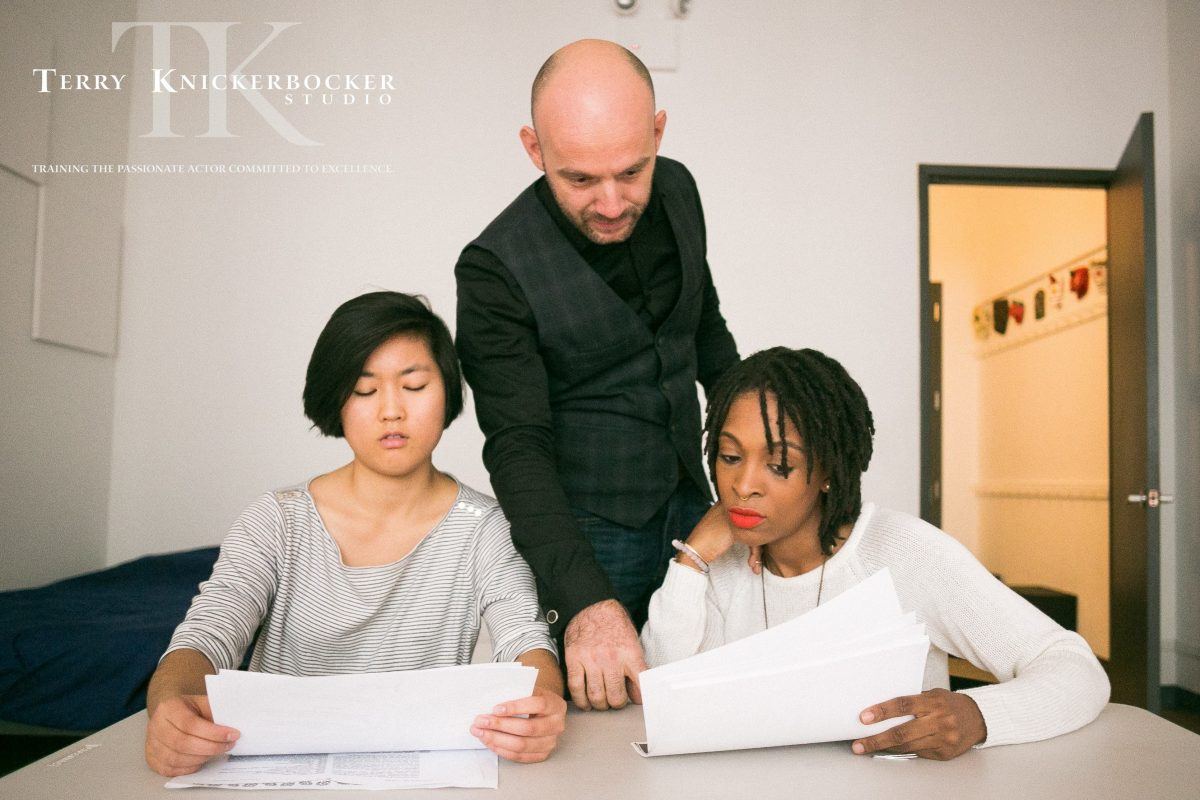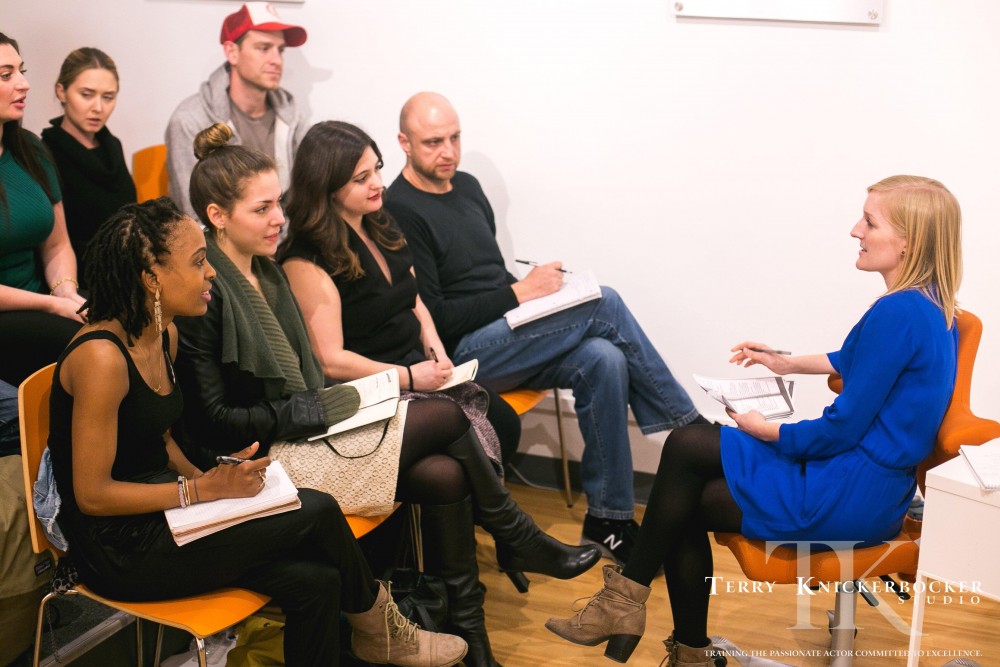
The Actor’s Rehearsal — Learning to Do The Work

Carolyn McCandlish and Kendrick Merdani have studied Meisner technique with Terry Knickerbocker and are now instructors under Sanford Meisner’s lineage of teaching at the Terry Knickerbocker Studio. Carolyn is currently teaching an Introduction to Meisner Class and Kendrick works with students one-on-one.
Rehearsal is such an integral part of acting and of the curriculum here – we caught up with Kendrick and Carolyn to hear their thoughts on the rehearsal process and what it means for actors.
What exactly is “Rehearsal”?
Kendrick: Rehearsal itself in French means “Repeat”. It goes back to the foundation of Meisner Technique, which is the repetition itself.
The rehearsal is a very necessary aspect of the whole process. Another metaphor that comes to mind is a term in the restaurant business “mise en place”, which means to put in place. The chefs have all their ingredients ready for the main meal. Rehearsal is very similar in that way because it is where you put everything together that you need for that particular performance.
What are the goals and intentions an actor should have for rehearsal?
Carolyn: I would say the most important intention for rehearsal is an attitude of discovery. Actors need to do their homework first to find a personal connection to the material, then rehearsal is about bringing those ideas you’ve come up with on your own and exploring them in relationship to your scene partner. Knowing that you’ve done your crafting in advance, you come to rehearsal to let go and allow yourself to be surprised by what happens in the room.
Ultimately, you’re trying to find specificity and meaning in every moment and carve out a structure for the scene. That’s when script analysis skills become invaluable, because you really have to know the meaning of each of the playwright’s words.
What is the relationship between rehearsal and performance? Is there a difference between rehearsing for a class or rehearsing for a staged performance?
Kendrick: I don’t think there should be a lot of differences. Granted, with a performance you have the director there to guide you through the process. However, in the classroom you have the notes that the teacher gives you. You can’t slack off. It’s never just a rehearsal; you have to always play for keeps. Things are going to pop up during rehearsal. You’re going to learn from your partner or yourself, and they are going to learn from you.
Carolyn: Rehearsal is where the bulk of the work happens…where you can try out all of your zany ideas then toss the ones that don’t fit or fall flat. Eventually those ideas get set into a repeatable framework that can be performed. In class, you may have a bit more freedom to explore because we approach each class as a rehearsal opportunity rather than a performance. But a performance should always still feel fresh and improvisational within the structure that has been set.
Rehearsal is also where you create good habits as an actor. In the professional world, so much of the work you do happens on your own time. There is no one holding your hand or holding you to a higher standard. Many actors aren’t prepared for auditions. If you are doing your work consistently, showing up prepared, knowing what every moment means then you stand out. There are so few things you can control as an actor in this business, but how professional you are is one of those things. Consistently bringing your A-game to class and rehearsal is how you cultivate that discipline.

What is the process of rehearsal at the studio like?
Carolyn: Students rehearse between every class, so it’s an essential part of the training. It’s all about striving to grow as an actor and to make the work clearer. The rehearsal process solidifies what we do in class and provides an opportunity to let it sink into your bones. It raises questions and helps you find where you’re struggling so students can be more proactive about their own journeys. Then when you come to class, we can steer you back on course and adjust the things that need to be adjusted.
Kendrick: The learning in the studio and in the classroom doesn’t just happen when you are working with your teacher. Ideas begin to form when you’re watching your classmates’ work as well. It’s a 3D space of learning. You have private rehearsal, when you rehearse in class, and when you watch your classmates work. Those last two aspects are very important.
Most people think once they show their work they are done but that isn’t the case. Even the questions that are asked in class are very important for the process of becoming the best actor you can be.
Any tips for actors struggling in rehearsal?
Kendrick: You cannot dive into the whole text with every rehearsal. The first few rehearsals should be small bites. Just like when making a meal – you don’t put all the ingredients in at once. We start with working from moment to moment.
Something I have put into use myself when things feel stuck is switching roles with your partner. It gives me more understanding of how I can deliver the other character’s lines and how my character can affect this other character as well. You gain more understanding this way, but also you get ideas from them as well. They will bring up something you had never thought of that is instinctual, expressed in the moment.
Carolyn: You’re probably going to start out with a lot of holes in your performance — things you don’t yet understand. Be patient. Once you figure out what a moment means, you’ve solved it and can move on to the next hole. The main tip for feeling stuck though is always to put your attention on the other person. When we focus on our struggle, we often put pressure on ourselves to find answers, which then draws our attention inward. But if you are really listening and staying present with your partner, the text will come alive and you will learn something new.
Kendrick: In the early stages of rehearsal, I have a technique that helps my partner: I get the lines really down and my intentions clear. I have my partner say his or her line, then I repeat his line as a question, and answer him back.
Carolyn: Sometimes you have limited or no time to rehearse, particularly in film. So you should always have multiple ideas. If a director says, “I don’t love that idea – do you have another?” you can say, “Yes I have four more ideas!” Keep tapping into your imagination so you are always bringing something fresh to the table. Directors will be so grateful and your work will be more authentic and vibrant.
Kendrick: Sometimes you get on set and you’re lucky if you get a rehearsal. It’s mostly about the camera. The most reliable set of tools I have gotten from training has been from studying with Terry. It has allowed me to get to the point of what I need to do a lot faster. It isn’t the only way, but this is the way I consistently go back to. It’s a solid foundation for me.